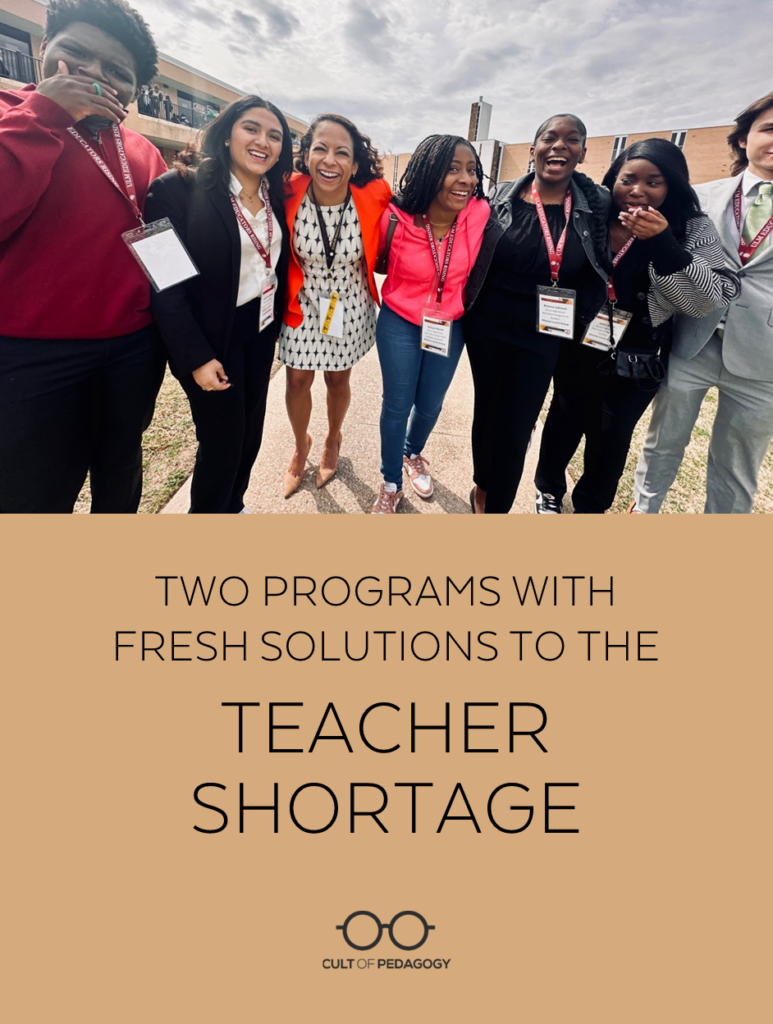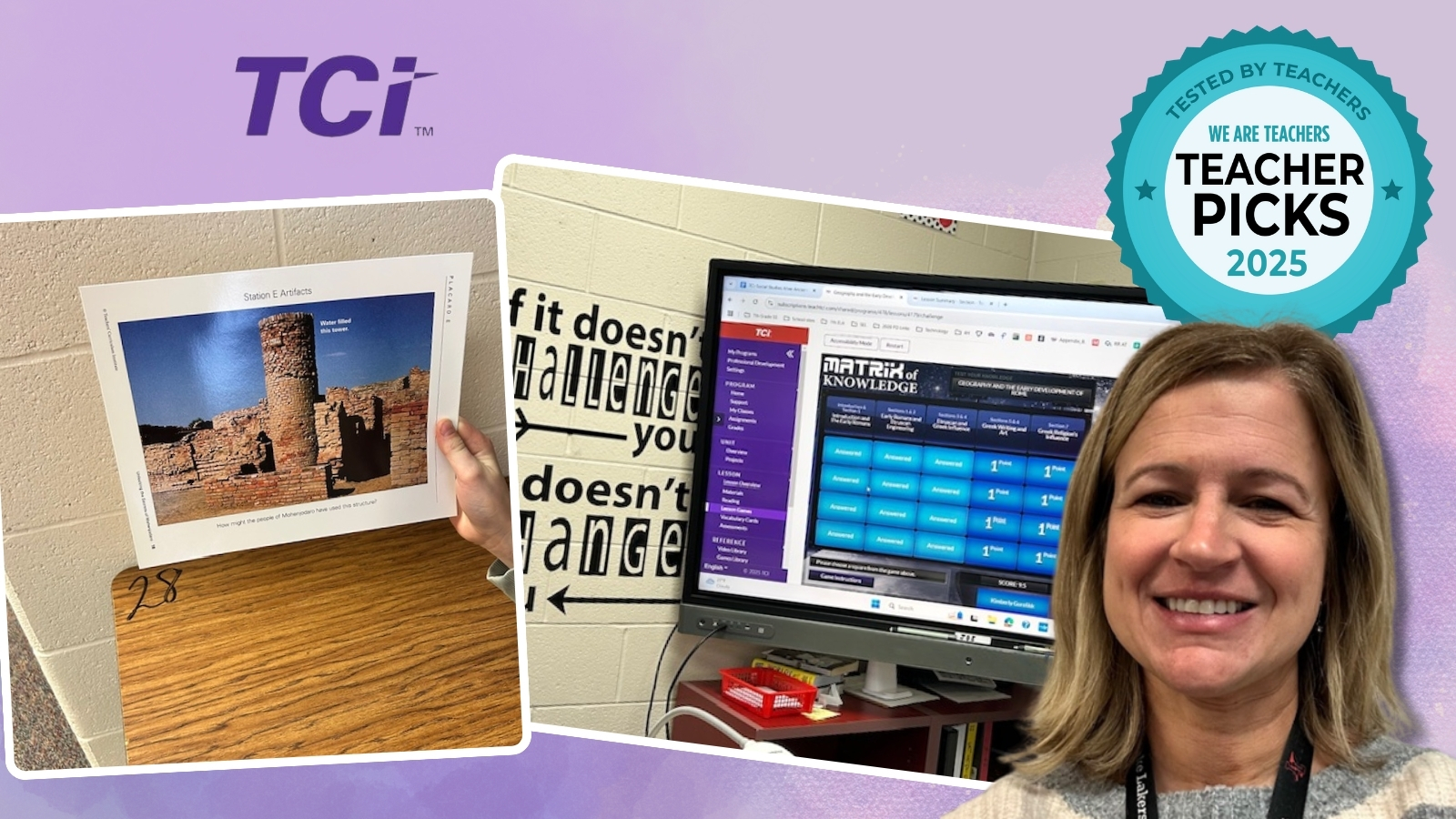Listen to the interview with Kimberly Eckert (transcript):
Sponsored by Edge•U Badges and EVERFI
We’ve been hearing about a teacher shortage for a while now, certainly since the pandemic, and multiple studies show that many states are seeing record high numbers of teacher turnovers and vacancies. In 2022, we explored some of the reasons teachers are leaving the classroom, so we won’t go into them here. Suffice it to say there are big problems, especially in some states, and those problems have not gone away.
However, there are groups of smart, highly motivated people who are coming up with some creative ways to address this situation, surprisingly affordable pathways for training good, enthusiastic educators. Because they train teachers from within communities with the greatest shortages, these grow your own programs often improve the diversity of the teaching force, helping to balance out what has been a long-standing mismatch between a mostly white teaching force and an increasingly diverse student population.
I can’t think of a better person to dig into this topic with me than Kimberly Eckert. Her resume is too long to list here, but she’s been a special ed teacher, the 2018 Louisiana Teacher of the Year, a mentor to many, an award-winner, and a leader in too many education initiatives to name. I met her a few weeks ago at an incredible dinner in Austin, Texas, and after learning what she’s been up to for the last few years, I wanted to have her on the podcast to talk about her work.
On the podcast, Kim and I talked about two grow-your-own programs she’s an essential part of, and how and why both of these outstanding programs work. To learn more, you can listen to our conversation above, read the transcript, or read my summary of both programs below.
My hope is that everyone who reads this will know someone who might benefit from the programs, who can support their growth in some way, or who can use them as a model to start doing something similar.
Program 1: Educators Rising
Educators Rising is a national grow-your-own program that nurtures middle and high school students who want to become teachers. Through school-based chapters, EdRising gives students training and clinical teaching experience before they ever set foot on a college campus.
The former state coordinator for the Louisiana chapter of the organization, Eckert had a significant hand in growing the program in her state. As a teacher recruiter, she was well aware of the shortage of teachers in her region, which wasn’t a new thing. “If you’re in rural spaces or urban spaces, you’re going to know that there’s a lot of folks who have never had access to a steady stream of highly skilled teachers.”
There was also the matter of diversity, or lack thereof. “As a Black woman, (I knew) there weren’t very many of us. I represented the diversity in terms of racial diversity in a lot of spaces that I was in. So I’m like, we don’t have a diverse pipeline. We barely have a pipeline. What can we do about this?”
After extensive research, she decided that the path she wanted to pursue for her state was Educators Rising, which gets young people started on a path to teaching as early as middle school.
“It takes years to be a great teacher,” Eckert says. “The earlier we can get young people started, I think that their career trajectory is going to look very different than anything really has before. When we start sooner, they actually start stronger.”
Eckert (3rd from left) with EdRising students from Brusly High School in Brusly, LA.
Aside from the fact that EdRising was already part of an established national organization with a proven track record, she also loved their curriculum. “It was written to appeal to Gen Z, so (it focused on) the idea of social justice, of using the classroom as a means for change, literacy as a means for change.”
Eckert believes this appeal to social change is what makes EdRising different from recruitment programs of the past.
“You can’t be like, hey, come to the teacher meeting and have free pizza,” she says. “Nobody cares about your pizza because nobody wants to be a teacher. You could pay them and they won’t come to the meeting. But shifting the message — Do you want to change the world? Do you want to have a lasting impact? Do you want to be remembered forever? Do you want to be the change in your community? Come to this meeting in Room 103. Let’s see what’s popping. — then we’re getting somewhere.”
Educators Rising can be implemented as an extracurricular club, a career technical education instructional program, a career technical student organization, or a co-curricular program. To learn more about starting a program in your district, visit this page.
Program 2: Oxford Teachers College at Reach University
Early in her career as a special ed teacher, Eckert saw the incredible work being done by paraeducators, who knew the kids well and poured their hearts into their jobs, but who got paid very little and lacked the necessary training to really make a difference. Taking matters into her own hands, Eckert held her own mini-PD sessions with them, and as she got to know them better, she became “obsessed with them,” she says. With so much teaching talent, she couldn’t understand why they weren’t certified teachers.
So she asked, and she heard their stories.
Many had set out to become teachers, but got derailed for “all the reasons in the world,” Eckert says. “They were in college and then their mother passed away. Or they were in college and their grandmother needed a caregiver, or they got pregnant, and then they got pregnant again. Or they had a terrible relationship and a husband that was abusive. Or their dad said girls don’t go to college. I mean I just heard it all. And then you have some where it’s like, you know what? It was 15, 16 years ago. I was way too young. I flunked out, I didn’t appreciate … whatever it might be.”
While she understood how each person’s plans changed, why every path took a turn, she didn’t want to accept it. “It does not sit well with me that the rest of your life is determined and there are entire doors locked to you because of what a season of your life held. And so it was just like, Oh wow. We got some stuff to fix. Let’s see what we can do.“
Because of her work with Educators Rising, Eckert’s name was passed to the leadership of Reach University, a nonprofit university that had started to offer an alternative credentialing path to teacher candidates in California. Reach was preparing to expand its offerings into Louisiana and Arkansas as Oxford Teachers College.
Long story short: Eckert now serves as Dean at Oxford.
Oxford Teachers College at Reach University is an online program that offers job-embedded undergraduate degrees and teacher preparation programs for current school employees — paraeducators, teaching assistants, and other school staff members who already love and know the kids in their communities and just need a little more training and education to become certified. Through what Eckert describes as “a very intricate weaving of funding” including grants and donations, teacher candidates only pay $75 per month to attend.
Eckert (foreground) visits teacher candidate Gwen Thomas (back left), her principal Juanita Dotson (back right), and her students at Earle Elementary School in Earle, AR. Thomas spent over 20 years as a preschool paraeducator before enrolling in the Reach program. She will soon receive her degree to become a certified classroom teacher.
Many of the paraeducators Eckert worked with in her original PD group were part of Oxford’s inaugural class, which just graduated last May. “And all of them are now employed in my district,” she adds proudly.
And their teaching? It’s blowing her out of the water.
“I’ve never seen novice teachers start this strong out of the gate,” she says. “It gives me chills thinking of how powerful and how reflective they are and the way that they see their relationship between student learning and their own actions. They were trained for this from day one to really kind of lean into what a school really is and what it could be. And they don’t see kids as problems. They see them as solutions. And that just makes such a huge difference. They love their community. They love the kids. And we’re just seeing how powerful that is in the making of a great teacher.”
The program is still limited to candidates in “Louisiana, Arkansas, Alabama, California, Colorado, and a touch of Texas,” Eckert says. “It’s like Coming to a state near you. But we also just launched the National Center for the Apprenticeship Degree,” — a new initiative working to spread the adoption of these kinds of job-embedded degrees across the U.S. — “So if someone’s in a state that’s not one of those, I would honestly say, let’s see what we can figure out.”
Janae Montgomery (left), is a former paraeducator and was among the first class of Reach graduates. She now teaches a self-contained special ed class.
The Difference is Access
When asked what is special about both of these programs compared with how we have traditionally trained teachers, Eckert says it comes down to access.
“You could have the most amazing preparation,” she says, “but if you’re not attending to reducing barriers, then people can’t access it.”
Although the teacher shortage is far from over, Eckert believes that many of the teachers we need, the ones who may be the very best fit for the job, are already in the same classrooms that need them.
Let’s help them find their way to the front of the room.
To follow more of Kimberly Eckert’s adventures in raising up the next generation of teachers, you can find her on Instagram or LinkedIn.
Join our mailing list and get weekly tips, tools, and inspiration that will make your teaching more effective and fun. You’ll get access to our members-only library of free downloads, including 20 Ways to Cut Your Grading Time in Half, the e-booklet that has helped thousands of teachers save time on grading. Over 50,000 teachers have already joined—come on in.
The post Two Programs with Fresh Solutions to the Teacher Shortage first appeared on Cult of Pedagogy. Grow-your-own programs are training teachers who know and love the communities they serve.
The post Two Programs with Fresh Solutions to the Teacher Shortage first appeared on Cult of Pedagogy. Career & PD, Hot Topics, Leadership, Podcast, career & PD, programs & systems, school administration Cult of Pedagogy









